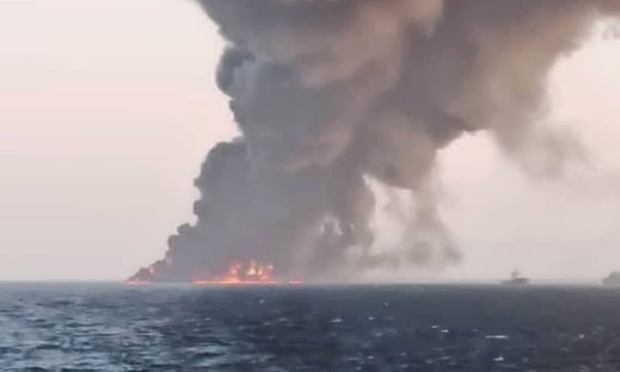Iranian navy’s largest ship catches fire and sinks
By Vivian Yee
CAIRO — Iran’s largest Navy ship sank Wednesday (2) after catching fire in the Gulf of Oman near a major shipping lane, a semi-official Iranian news agency reported. It was the latest in a series of explosions, fires and other mishaps at Iranian military and nuclear infrastructure in recent months, just as Iran and the United States began negotiating a possible return to the 2015 nuclear agreement.
The Tasnim news agency, citing a statement from Iran’s navy, said that the ship, the Kharg, had been deployed to international waters to participate in a naval exercise when “one of its systems” caught fire. The Kharg, which Tasnim described as a “training and logistical ship,” had been in service for more than 40 years and was routinely included in training operations, the news agency said.
Military and civilian crews battled the fire for 20 hours before the ship sank off the coast of the southern port of Jask, Tasnim reported. The crew members managed to evacuate after the fire broke out and were transferred to shore, the report noted, suggesting that there were no casualties. The Kharg, also spelled Khark in English, serves as a naval replenishment ship and is Iran’s largest vessel by tonnage weight, according to an analysis of Iran’s navy.
For Iran, mysterious naval incidents have rarely remained just that. Although it was too early to assign responsibility for the Kharg fire, the timing — as Iran and the United States are back at the negotiating table, discussing whether to once again lift US sanctions in exchange for limiting Iran’s nuclear and other military activities — raised alarm.
Iran has many regional foes who are leery of renewing such a deal, including Israel, which has tacitly acknowledged responsibility for several recent attacks on Iranian nuclear facilities and the brazen killing of a top nuclear scientist, and Gulf countries such as the United Arab Emirates and Saudi Arabia.
In April, an Iranian military vessel stationed in the Red Sea was damaged by an apparent Israeli mine attack, the first time that Israeli-Iranian skirmishes at sea had affected an Iranian ship used for military purposes.
“Obviously, the thing we’re all looking for is if the Israelis are involved,” said Sanam Vakil, deputy director of the Middle East and North Africa Program at Chatham House. “The Israeli security establishment is using this period to define some new red lines vis-à-vis Iran and really demonstrate their capacity.”
Israel, she added, has been sending a message to the United States and the region that it is “willing to act independently in order to protect its security interests.”
The Iranian port of Jask sits on the Gulf of Oman near the Strait of Hormuz, a vital shipping lane that leads to the Persian Gulf. It is an area where the fraught relations between Iran, the United States and its allies have played out: Beginning in 2019, ships in the Gulf of Oman suffered a series of maritime guerrilla attacks, crippling commercial oil tankers and spooking worldwide oil markets.
The United States said that the attacks were a tacit threat by Tehran to block the shipping artery and accused it of targeting the ships with limpet mines, even releasing a video that showed members of Iran’s Revolutionary Guard removing an unexploded mine from a vessel. Iran denied attacking the ships.
Yet Iran also has a history of naval disasters that are apparently unrelated to external enemies. During a military training exercise last year, a missile from an Iranian frigate mistakenly struck another ship near the same port, Jask, killing at least 19 sailors and wounding 15.
It may not be easy to distinguish clumsiness from obfuscation. Iran played down Israeli involvement in recent attacks in an effort to lower tensions and avoid acknowledging Israel’s successes, blaming instead internal sabotage.
“It’s bad if it’s their own fault, and it’s bad if the Israelis are behind it,” Vakil said. “It’s embarrassing either way. So the question is: How are they going to spin this?”
-New York Times


